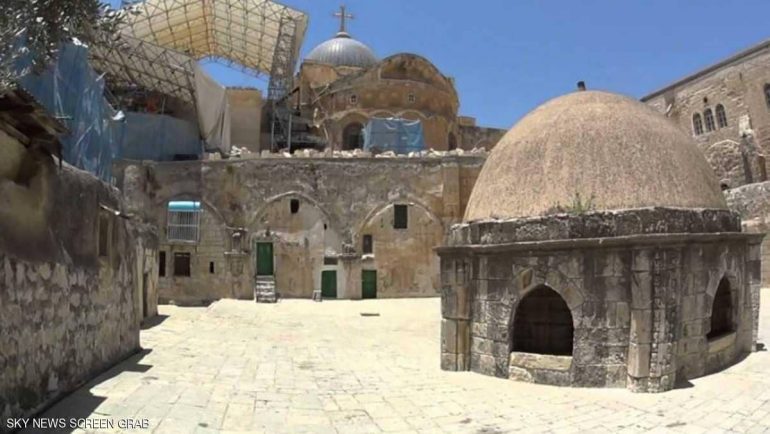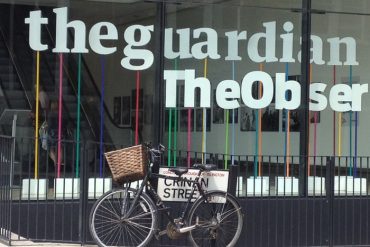The belief that Jordan has an official role safeguarding Muslim and Christian holy sites in Jerusalem is nearly universal among Arabic-speaking media outlets in the West – a view reinforced by Western Arabic media outlets’ reports, which typically include a comment by a spokesperson in Amman.
Jordan was indeed the previous de facto ruler of east Jerusalem between 1948-1967, and annexed it (along with the West Bank) in 1951 in a move only recognized by the UK and Pakistan. They maintained territorial claims to the holy city as late as 1988. However, the decision to view Jordan as a potential party to all affairs related to both Christian and Muslim sites is justified in Arabic media outlets differently.
For example (all translations, emphases and remarks are by CAMERA Arabic):
- An AFP report published earlier this month (“Clashes in Jerusalem’s al-Aqsa plaza”, June 2nd), which covered a confrontation between the Israeli police and Muslim demonstrators over Jews’ visits to the Temple Mount, referred to Jordan as the “guardian” of holy sites in Jerusalem, without specifying in what way the country is recognized as such:
“Jordan, the guardian of the Muslim and Christian religious sites in Jerusalem, has condemned the ‘ongoing Israeli violations’ in al-Aqsa Mosque”.
- A Reuters report, covering the same incident (“Extremist Jews’ visit provokes anger among Palestinians on the grounds of al-Aqsa Mosque”, June 2nd), invoked a bilateral agreement between Amman and Ramallah as the legal basis of its “guardianship” over holy sites:
“Abd an-Naser Abu al-Basal, Jordan’s Minister of Awqaf and Islamic affairs has said: ‘the occupation [i.e. Israel] must not get involved in the blessed al-Aqsa Mosque, which is the property of the Muslims alone, nobody shares it with them and it is neither shareable nor divisible.’ Jordan is the guardian of the Muslim and Christian holy sites in Jerusalem, according to an agreement with the Palestinian Authority.”
- A report published six months ago at Sky News Arabia – a venture between UK-based Sky News and UAE-based Abu Dhabi Media Investment Corp – covering a Coptic-Egyptian protest in Jerusalem concerning an Ethiopian-controlled shrine near the Church of the Holy Sepulcher (“Coptic Anger after an ‘Israeli assault’ on Deer As-Sultan in Jerusalem”, October 24th, 2018), claimed that Jordan is a “caretaker” of the sites due to its peace treaty with Israel:
“the Muslim and Christian shrines in Jerusalem are under the custody of the Hashemite Kingdom of Jordan, according to the peace agreement between Israel and Jordan.”
Such differences raise questions concerning Jordan’s true credentials as the guardian (in Arabic: وصي, Wasiy) or custodian/caretaker (راعي,Ra’i) of Jerusalem’s sanctuaries.
As it turns out, the Jordanian special role regarding the Muslim holy sites (al-Aqsa Mosque on Temple Mount, first and foremost) is indeed widely recognized by numerous parties to the conflict over Jerusalem, as well as various members of the international community. It bares mentioning, though, that not all of them use the rather specific term “guardian” – which, in the context of Jerusalem, dates back to a 1924 verbal decision taken by the Supreme Muslim Council of Mandatory Palestine regarding the then-Transjordan Hashemites.
However, when it comes to Jerusalem’s Christian sites, Jordan does not have such a guardianship role – and all three reports mentioned above egregiously misled their audiences.
Chronologically speaking, the earliest report of the three (published by Sky News Arabia last October) also contains the gravest falsehood. CAMERA Arabic already dedicated a post (English/Arabic) to the report, pointing out that the 1994 peace treaty between Israel and Jordan only refers to Jordan’s special role for Muslim holy sites:
Article 9, Paragraph II:
“Israel respects the present special role of the Hashemite Kingdom of Jordan in Muslim Holy shrines in Jerusalem. When negotiations on the permanent status will take place, Israel will give high priority to the Jordanian historic role in these shrines.”
Similar in content to this legally binding treaty with Israel is a 2014 statement by the former Secretary of State of the United States, John Kerry, referring only to the Temple Mount, and a 2017 statement by the current President of Turkey, Recep Tayyip Erdogan, referring to Muslim Waqfs more generally.
Having shown that Jordan’s treaty with Israel refrains from even mentioning Christian holy places, it’s clear why the phrasing that appeared in the June 2nd AFP report is problematic as well. In AFP’s report, Jordan’s position as guardian of “Christian religious sites” is mentioned in the most casual and uncritical manner – in the form of a brief description in the (supposedly neutral) reporter’s own voice. In other words, its implied that the Hashemite Kingdom’s guardianship over Christian sites is as uncontroversial as the fact that it borders the Dead Sea.
Even the Reuters report, which draws a connection between Jordanian guardianship over Jerusalem’s Christian holy sites and an agreement it signed with the Palestinian Authority, lacks nuance and is misleading. In fact, the only reference to Christianity in the 2013 agreement is found in its preamble, where it recites exactly one piece of Jordanian legislation, dealing exclusively with a single Christian sect:
Preamble, article IV: “Based on the role of the Sharif Hussein bin Ali as a protector and caretaker of the holy places in Jerusalem and their buildings since 1924 […] the guardianship over the holy places has reached [the hands of] His Majesty King Abdullah II bin Hussein, including the Greek Orthodox Patriarchate of Jerusalem, that is subject to Jordanian Law No.27 of the year 1958.”
The rest of the agreement refers to “the holy places” in general, with only Muslim sites (e.g. the Dome of the Rock) mentioned by name. Consequently, deriving from article IV alone that the Palestinians categorically recognize Jordan as the guardian of Christian sites in Jerusalem is far from accurate. Moreover, the question of the international legal validity of an agreement between a sovereign state and a partially-sovereign entity – neither of whom rule east Jerusalem in practice – is debatable, especially since no other agreement (i.e. the peace treaty with Israel) is mentioned alongside it.
Clearly, the three Arabic news sites did not apply basic journalistic standards of fact-checking and objectivity when declaring Jordan the “guardian”, “custodian” or “caretaker” of Jerusalem’s Christian sanctuaries. But another question arises: on what grounds does Jordan itself claim this status, especially considering its 1988 decision to disengage legally and administratively from the West Bank? Again, unlike the Muslim holy sites of Jerusalem, the Christian ones were not originally declared as an exception to the disengagement, as is apparent from a paragraph found in the official memorial website to former King Hussein, Abdullah II’s late father:
“Recognizing the desirability of supporting the Palestinians in their struggle for independence, on July 28, 1988, King Hussein announced the cessation of a $1.3 billion development program for the West Bank […]Two days later, he formally dissolved Parliament, ending West Bank representation in the legislature. Finally, on July 31 he announced the severance of all administrative and legal ties—with the exception of guardianship over the Muslim Holy Sites of Jerusalem—with the occupied West Bank.”
Unfortunately, CAMERA Arabic did not find any clear answer to this question. What is certain is that by the late 2010s, establishing Jordan’s position as the caretaker of both Muslim and Christian holy sites in Jerusalem had become an integral part of Jordanian foreign policy, and is now promoted relentlessly by the Jordanian press.
Over the last two years, it has also been endorsed by at least one Jerusalem Christian leader (the head of the same Greek Orthodox Patriarchate referred to in the Palestinian-Jordanian agreement), as well as by one major international organization – the Organization of Islamic Cooperation (OIC) of 57 members, including Jordan itself, Turkey and the Palestinian Authority (under the self-proclaimed and partially-recognized title “State of Palestine”).
The OIC issued the following statement in the final communique of its May 2018 emergency summit:
“We, the Kings and Heads of State and Government of the Member States of the Organization of Islamic Cooperation (OIC) […] affirm support for the historical Hashemite Custodianship assumed by His Majesty King Abdullah II Ibn Al-Hussain on Muslim and Christian holy sites in Al-Quds, which was reaffirmed by the agreement signed between His Majesty King Abdullah II and His Excellency Mahmud Abbas, President of the State of Palestine on 31 March 2013; and for the role of the Jordanian Department of Al-Quds and Al-Aqsa Mosque Islamic Waqf in preserving and defending Al-Haram Al-Quds Al-Sharif.”
Of course, it is unclear on what legal or political basis this Saudi-based Islamic organisation is deemed worthy of determining who guards Christianity’s Jerusalem holy sites.
Research and writing by CAMERA Arabic. Edited by UK Media Watch.





